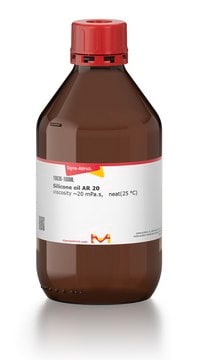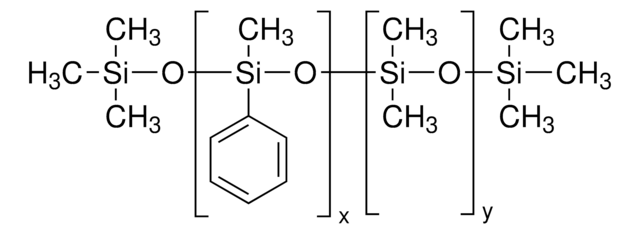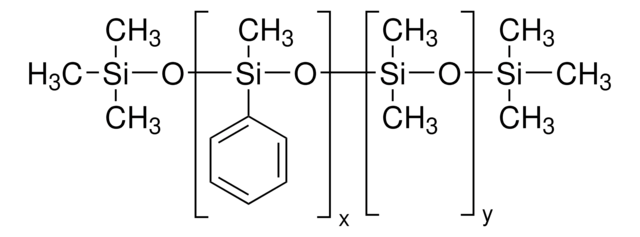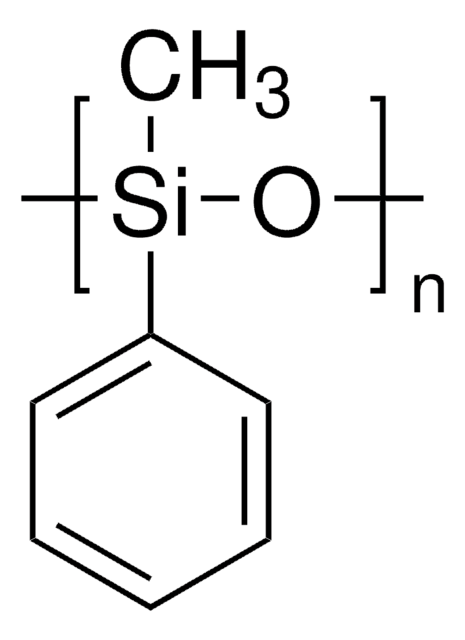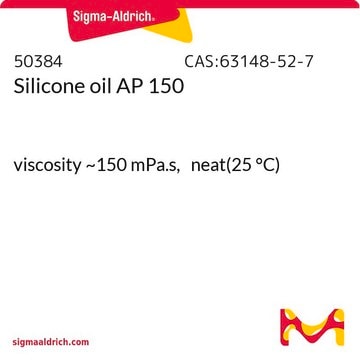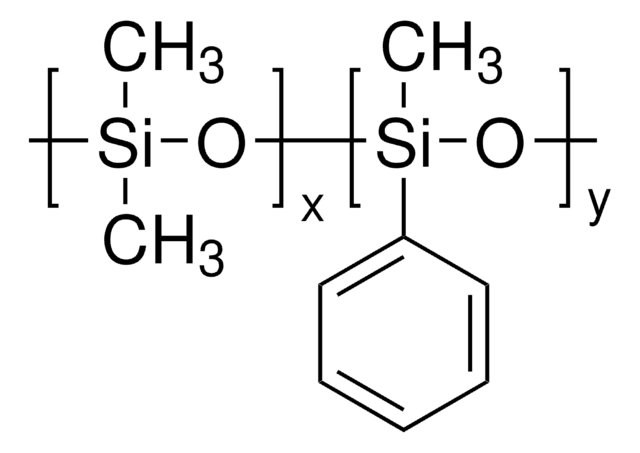10842
Silicone oil AP 1000
viscosity ~1000 mPa.s, neat(25 °C)
Synonym(s):
Polyphenyl-methylsiloxane
Sign Into View Organizational & Contract Pricing
All Photos(1)
About This Item
Recommended Products
refractive index
n20/D 1.512
Quality Level
viscosity
~1000 mPa.s, neat(25 °C)
density
1.09 g/mL at 20 °C
Related Categories
General description
Silicone oil AP 1000 is a polydimethylsiloxane with a high proportion of phenyl groups.
Trace amounts of acids, alkalis, mineral oils, organometallic compounds, and metal salts/oxides are known to reduce the service life of the silicone oil.
Trace amounts of acids, alkalis, mineral oils, organometallic compounds, and metal salts/oxides are known to reduce the service life of the silicone oil.
Application
Silicone oil AP 1000 is useful as:
- pressure transfer oil
- heat transfer oil
- a dielectric in capacitors and transformers
- base fluid of heat resistant lubricants
Features and Benefits
Especially good thermostability (-35°C to +200°C)
Storage Class Code
10 - Combustible liquids
WGK
WGK 3
Flash Point(F)
536.0 °F
Flash Point(C)
280 °C
Personal Protective Equipment
dust mask type N95 (US), Eyeshields, Gloves
Choose from one of the most recent versions:
Already Own This Product?
Find documentation for the products that you have recently purchased in the Document Library.
Customers Also Viewed
C Eckardt et al.
Ophthalmologica. Journal international d'ophtalmologie. International journal of ophthalmology. Zeitschrift fur Augenheilkunde, 201(3), 133-139 (1990-01-01)
Different methylphenylsilicone (MPS) and fluorosilicone (FS) oils having a higher specific gravity than water were investigated as vitreous replacements. Their intraocular tolerance in vitrectomized aphakic rabbit eyes was evaluated for periods of up to 4 months and compared to that
H Kriegs et al.
The Journal of chemical physics, 124(10), 104901-104901 (2006-03-18)
In some polymers, in addition to the usual structural alpha relaxation, a slower alpha' relaxation is observed with a non-Arrhenius temperature dependence. In order to understand better the molecular origin of this alpha' relaxation in poly(methylphenylsiloxane) (PMPS) we have studied
O Gyllenhaal et al.
Journal of chromatography, 516(2), 415-426 (1990-09-21)
The supercritical fluid chromatography of intact aliphatic amines with different columns is described. One group of amines was based on N,N-dimethyl-n-octylamine and related primary and secondary amines, and the other on the amino alcohol metoprolol and several of its analogues.
Janka Mydlová-Memersheimerová et al.
Journal of chromatography. A, 1216(32), 6043-6062 (2009-07-11)
The gas chromatographic-mass spectrometric (GC-MS) separation of all 209 polychlorinated biphenyl (PCB) congeners was studied on an extremely efficient 80 m x 0.1mm i.d. capillary column coated with a 0.1 microm film of poly(5%-phenyl methyl)siloxane stationary phase. The quality of
Gema Flores et al.
Journal of chromatography. A, 1153(1-2), 29-35 (2007-02-20)
A method based on the use of absorbents as packing materials in the interface of the direct coupling between reversed phase liquid chromatography and gas chromatography (RPLC-GC) is proposed. To that end, a comparative study on different adsorbents and absorbents
Our team of scientists has experience in all areas of research including Life Science, Material Science, Chemical Synthesis, Chromatography, Analytical and many others.
Contact Technical Service